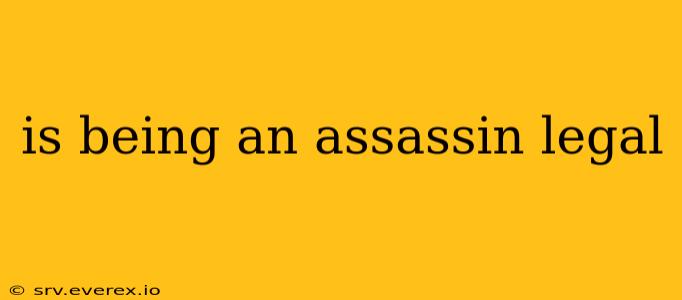The question, "Is being an assassin legal?" has a straightforward answer: no. Murder, regardless of motive or method, is illegal virtually everywhere in the world. The act of being an assassin—a professional killer who murders for payment—is not only morally reprehensible but also a severe criminal offense, punishable by lengthy prison sentences or even the death penalty in some jurisdictions. This post will explore the legal ramifications, the ethical considerations, and the complexities surrounding this grim profession.
The Legal Framework: Murder and Conspiracy
The legality of assassination hinges on the fundamental illegality of murder. Most legal systems define murder as the unlawful killing of another human being with malice aforethought. This means the act was intentional and premeditated. An assassin, by definition, plans and executes the killing for financial gain or other reward, satisfying the criteria for malice aforethought.
Beyond the act of murder itself, an assassin is also liable for conspiracy charges. Conspiracy to commit murder involves plotting and agreeing with others to carry out the killing. This conspiracy element can significantly extend the potential penalties faced by the assassin and anyone involved in the plot. Evidence gathering in such cases often involves intricate investigations, surveillance recordings, financial transactions, and witness testimonies.
Variations in Law Across Jurisdictions
While the core principle remains consistent – murder is illegal – the specific charges and resulting penalties vary considerably across different legal systems. Factors such as the degree of premeditation, the use of weapons, the victim's identity, and the presence of aggravating circumstances (such as torture or hate crimes) all influence sentencing. Some countries impose harsher penalties than others, including capital punishment. Furthermore, the legal definitions of murder and related offenses can differ subtly, leading to variations in how such cases are prosecuted.
The Ethical Dimensions: Morality and Human Life
The illegality of assassination is not solely a matter of legal statutes. It fundamentally violates deeply held ethical and moral principles that uphold the sanctity of human life. The intentional taking of a human life, especially for profit, is considered an egregious act by most societies, regardless of the perpetrator's personal beliefs or the victim's background.
This ethical consideration transcends legal frameworks. Even in hypothetical scenarios where a targeted individual poses an immediate and significant threat, the act of assassination remains ethically problematic. The potential for collateral damage, errors in judgment, and the slippery slope of legitimizing extrajudicial killings are all significant concerns.
The Reality of Assassinations: Myths and Misconceptions
Popular culture often romanticizes or sensationalizes the life of an assassin. However, the reality is far more mundane and brutal. Many assassins are not highly trained specialists but individuals motivated by greed or coercion, leading to poorly planned and poorly executed acts of violence. Successful assassinations are often the result of meticulous planning, extensive surveillance, and a high degree of luck, rather than the flawless execution often portrayed in fiction.
Conclusion: A Grave Offense with Severe Consequences
To reiterate, being an assassin is categorically illegal. The act constitutes premeditated murder, often involving conspiracy, and carries severe penalties under the law. The ethical implications far outweigh any perceived benefits, highlighting the inherent immorality of such acts. The romanticized image of assassins in popular culture starkly contrasts with the brutal reality of violence, betrayal, and often tragic consequences for all involved.
